Related Research Articles
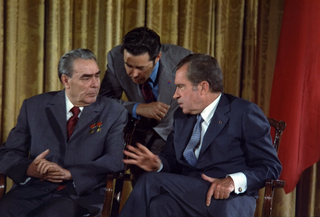
Détente is the relaxation of strained relations, especially political ones, through verbal communication. The diplomacy term originates from around 1912, when France and Germany tried unsuccessfully to reduce tensions.

Containment was a geopolitical strategic foreign policy pursued by the United States during the Cold War to prevent the spread of communism after the end of World War II. The name was loosely related to the term cordon sanitaire, which was containment of the Soviet Union in the interwar period.
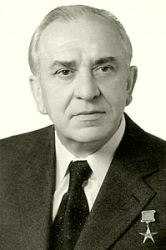
Viktor Vasilyevich Grishin was a Soviet politician. He was a candidate (1961–1971) and full member (1971–1986) of the Politburo of the Central Committee of the Communist Party of the Soviet Union.
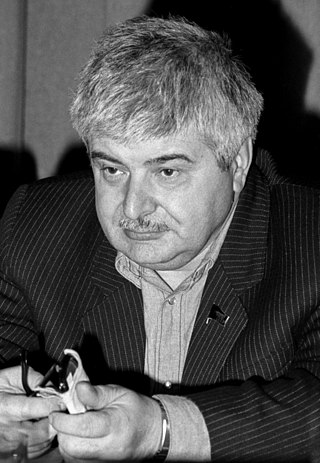
Gavriil Kharitonovich Popov, anglicised as Gabriel Popov, is a Russian politician and economist. He served as the mayor of Moscow from 1991 until he resigned in 1992.

Richard Edgar Pipes was an American historian who specialized in Russian and Soviet history. Pipes was a frequent interviewee in the press on the matters of Soviet history and foreign affairs. His writings also appear in Commentary, The New York Times, and The Times Literary Supplement.
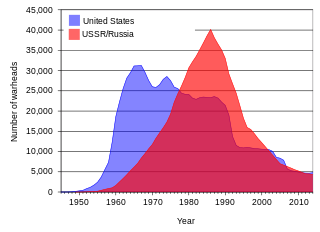
Team B was a competitive analysis exercise commissioned by the Central Intelligence Agency (CIA) to analyze threats the Soviet Union posed to the security of the United States. It was created, in part, due to a 1974 publication by Albert Wohlstetter, who accused the CIA of chronically underestimating Soviet military capability. Years of National Intelligence Estimates (NIE) that were later demonstrated to be very wrong were another motivating factor.
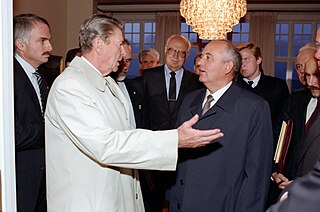
The Reykjavík Summit was a summit meeting between U.S. President Ronald Reagan and General Secretary of the Communist Party of the Soviet Union Mikhail Gorbachev, held in Reykjavík, Iceland, on 11–12 October 1986. The talks collapsed at the last minute, but the progress that had been achieved eventually resulted in the 1987 Intermediate-Range Nuclear Forces Treaty between the United States and the Soviet Union.
The Geneva Accords were the agreements on the settlement of the situation relating to Afghanistan, were signed on 14 April 1988 at the Geneva headquarters of the United Nations, between Afghanistan and Pakistan, with the United States and the Soviet Union serving as guarantors.

Nikolai Vasilyevich Ogarkov was a prominent Soviet military personality. He was promoted to Marshal of the Soviet Union in 1977. Between 1977 and 1984, he was Chief of the General Staff of the USSR. He became widely known in the West when he became the Soviet military's spokesman following the shootdown of Korean Air Lines Flight 007 near Moneron Island in September 1983. He was dismissed as Chief of the General Staff on 6 September 1984.
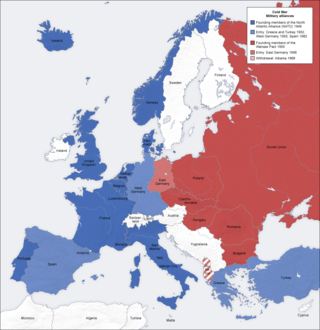
This is an English language bibliography of scholarly books and articles on the Cold War. Because of the extent of the Cold War, the conflict is well documented.

Relations between the Soviet Union and the United States were fully established in 1933 as the succeeding bilateral ties to those between the Russian Empire and the United States, which lasted from 1776 until 1917; they were also the predecessor to the current bilateral ties between the Russian Federation and the United States that began in 1992 after the end of the Cold War.

The Chief of the General Staff is the head of the General Staff and the highest ranking officer of the Russian Armed Forces or is also the senior-most uniformed military officer. He is appointed by the President of Russia, who is the Supreme Commander-in-Chief. The position dates to the period of the Russian Empire. The current Chief of the General Staff is Army General Valery Gerasimov.

Sergo Anastasi Mikoyan was a Russian historian. He was a leading specialist in the foreign policies of the Soviet Union and the United States in Latin America. He was the son of Anastas Mikoyan, an Old Bolshevik and high level Soviet statesman who served as a close advisor to Soviet premier Nikita Khrushchev.
The Terror Network: The Secret War of International Terrorism (ISBN 0030506611) is a 1981 book by Claire Sterling, published by Henry Holt & Company, which argued that the USSR was using terrorists as a proxy force.
Gennadi Fyodorovich Zakharov was a Soviet physicist who worked for the United Nations who was arrested in a sting operation by the Federal Bureau of Investigation (FBI) in 1986.

Michael Paul Pillsbury is a foreign policy strategist, author, and former public official in the United States. He is a senior fellow for China strategy at The Heritage Foundation and has been Director of the Center on Chinese Strategy at the Hudson Institute in Washington, D.C., since 2014. Before Hudson, he held various postings in the U.S. Department of Defense and U.S. Senate. He has been called a "China-hawk", and an "architect" of Trump's policy towards China. In 2018, he was described by Donald Trump as the leading authority on the country.
Mіkalay Mіkіtavіch Slyonkow was a Belarusian politician who was first secretary of the Communist Party of the Byelorussian SSR from 13 January 1983 to 6 February 1987 during the Soviet Union.
The Politburo of the 28th Congress of the Communist Party of the Soviet Union was in session from 1990 to 1991.

The 19th All-Union Conference of the Communist Party of the Soviet Union was a party conference held by the Communist Party of the Soviet Union from 28 June to 1 July 1988. The conference was attended by 4,991 delegates.
In political science, triangular diplomacy is a foreign policy of the United States, developed during the Vietnam War (1955–1975) by Henry Kissinger, as a means to manage relations between the contesting communist powers, the Soviet Union and China. Connecting heavily with the correlating policy of linkage, the policy was intended to exploit the ongoing rivalry between the two Communist powers, as a means to strengthen American hegemony and diplomatic interest.
References
- 1 2 3 4 "The Association for Diplomatic Studies and Training Foreign Affairs Oral History Project AMBASSADOR RAYMOND L. GARTHOFF" (PDF). Association for Diplomatic Studies and Training. 22 June 1989. Archived (PDF) from the original on 17 July 2024. Retrieved 17 July 2024.
- ↑ "Garthoff Bio". Brookings Institution. Archived from the original on 5 August 2011.
- ↑ thinktank bio PBS bio Accessed Dec 15, 2007
- ↑ Misinterpreting the Cold War: The Hardliners Were Right, Richard Pipes, Foreign Affairs, January/February 1995. Pipes' attempt to rebut Garthoff's book. Accessed Aug. 19, 2017